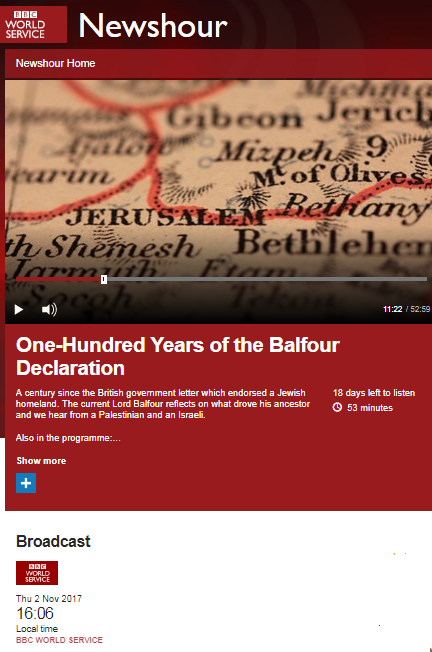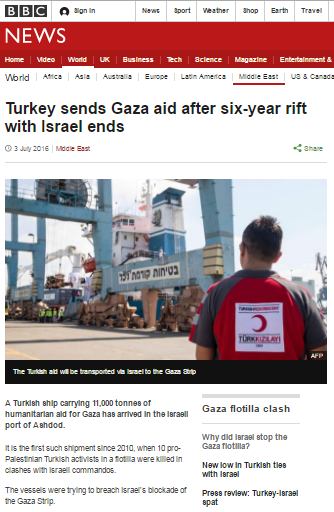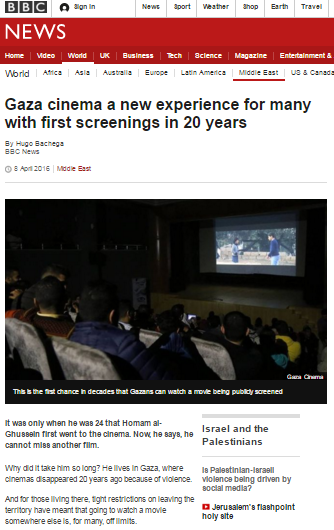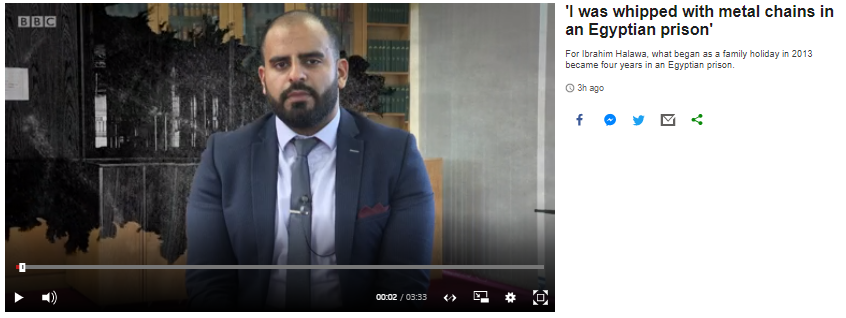In June 2019 we documented the BBC’s approach to the subject of Iran’s ties to the Houthi militia in Yemen:
BBC still fence-sitting on Iranian support for Houthis
The same editorial policy has been in evidence in the seven months since then, with BBC audiences seeing repeated promotion of messaging which originally appeared in a backgrounder titled “Yemen crisis: Why is there a war?” that is now dated 21 March 2019 but was first published in October 2016. For example: [emphasis added]
June 14th 2019, ‘Yemen war: Second assault on Saudi Abha airport in two days’:
“Alarmed by the rise of a group they believed to be backed militarily by regional Shia power Iran, Saudi Arabia and eight other mostly Sunni Arab states began an air campaign aimed at restoring Mr Hadi’s government.”
June 24th 2019, ‘Yemen war: Civilian killed in Houthi attack on Saudi airport’: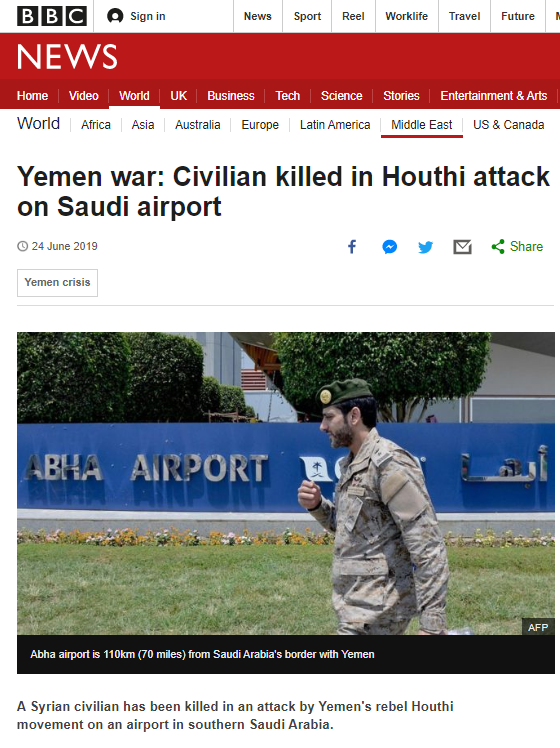
“The coalition has said the drones are “Iranian made”, but Iran has denied supplying weapons to the rebels. […]
Alarmed by the rise of a group they believed to be backed militarily by regional Shia power Iran, Saudi Arabia and eight other mostly Sunni Arab states began an air campaign aimed at restoring Mr Hadi’s government.”
August 1st 2019, ‘Yemen war: Houthi missile attack on military parade kills 32’:
“Alarmed by the rise of a group they believed to be backed militarily by regional Shia Muslim power Iran, Saudi Arabia and eight other mostly Sunni Muslim Arab states began an air campaign aimed at restoring Mr Hadi’s government.”
September 30th 2019, ‘Yemen war: Houthi rebels release hundreds of detainees’:
“Alarmed by the rise of a group they believed to be backed militarily by regional Shia Muslim power Iran, Saudi Arabia and eight other mostly Sunni Muslim Arab states began an air campaign aimed at restoring Mr Hadi’s government.”
December 29th 2019, ‘Yemen: Houthis blamed for attack on military parade’:
“Alarmed by the rise of a group they believed to be backed militarily by regional Shia Muslim power Iran, Saudi Arabia and eight other mostly Sunni Muslim Arab states began an air campaign aimed at restoring Mr Hadi’s government.”
January 19th 2020 (since amended and re-dated), ‘Yemen war: At least 70 soldiers killed in missile attack’:
“Alarmed by the rise of a group they believed to be backed militarily by regional Shia Muslim power Iran, Saudi Arabia and eight other mostly Sunni Muslim Arab states began an air campaign aimed at restoring Mr Hadi’s government.”
Interestingly, over the same period of time some other reports have given audiences a more realistic portrayal of the issue.
August 1st 2019, Frank Gardner, ‘Yemen war: Has anything been achieved?’:
“…for Yemen’s legitimate, UN-recognised government and its Saudi and Emirati backers, this war has always been about preventing an unacceptable takeover of the country by a tiny minority with links to Iran – the Houthis. […]
The war did not begin with the Saudi-led air campaign in March 2015. It began six months earlier when the Houthis, a small, largely unheard-of Yemeni tribal group from the mountainous north, marched on the capital, Sanaa, and evicted the legitimate government.
Then, with the backing of forces loyal to the ousted former Yemeni President Ali Abdallah Saleh, the Houthis took over most of the populated areas of Yemen.
For Saudi Arabia, Iran’s regional rival, this felt like an Iranian-backed coup on its southern frontier and the ruling princes resolved to act. […]
The UAE view is that its participation in this war has helped achieve several things. It has prevented a Houthi takeover of the whole country, which it considers would have ultimately given Iran control over the strategic Bab al-Mandeb Strait between Africa and Arabia.”
September 4th 2019, ‘Yemen: Western powers may be held responsible for war crimes – UN’:
“The Western powers provide weapons and logistical support to the Saudi-led coalition backing Yemen’s government, while Iran backs the Houthi rebels.”
September 16th 2019, Jonathan Marcus, ‘‘Drone’ attack on Saudis destabilises an already volatile region’: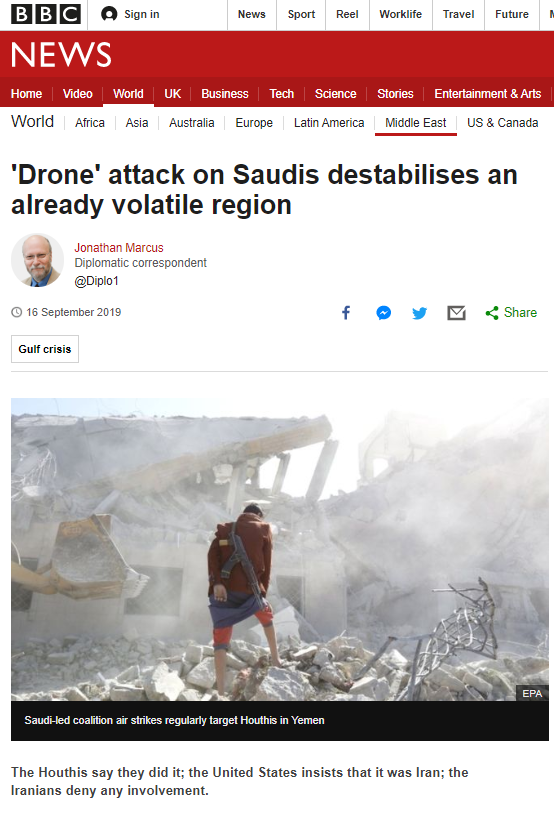
“Iran has well-developed ties with the Houthis and there is little doubt it has been the key player in enabling them to develop their long-range strike capability, whether through armed UAVs or missiles.
In 2018, a report from a UN expert panel pointed to the remarkable similarity between the Houthi Qasef-1 UAV and the Iranian Ababil-T. In a wide-ranging study, it asserted that Iran had broken the arms embargo against Yemen and supplied the Houthis with a variety of weapons systems.
Much the same conclusion was reached by a March 2017 study from the independent Conflict Armament Research organisation, which focused on Iranian UAV assistance. […]
Iran, along with its Houthi allies, is conducting a classic war of the weak against the strong; a “hybrid conflict” as it is known in the strategic textbooks. It is borrowing many of the tactics from the Russian play-book – the use of deniability; proxies; cyber-operations and information warfare.”
September 22nd 2019, ‘Iran warns foreign forces to stay out of Gulf, amid new US deployment’:
“Yemen’s Iran-aligned Houthi rebels said they had carried out the attacks….”
November 28th 2019, ‘Yemen civil war: 128 detainees sent home from Saudi Arabia’:
“Iran-supported Houthi rebels seized much of the west of Yemen and ousted President Abdrabbuh Mansour Hadi in March 2015.”
Obviously some BBC journalists are fully aware of the support provided by Iran to the Houthis – as has been documented by the UN and academic researchers.
“Iran has funded the Houthis even before the lawful regime fell in 2014. Most of the funding, $10- 25 million, was delivered courtesy of the Iranian embassy in Sanaa, in the form of support for cultural and religious events. This funding reflects one of the pillars of the Islamic Republic’s foreign policy – cultural and religious support for Shiite around the world. After the fall of the Yemenite lawful regime and the start of hostilities, Iran continued to funnel large sums of money through Sanaa International Airport until coalition forces shut it down in 2015. It should be noted that despite a blockade that has been imposed on Yemen’s naval ports, ships with humanitarian aid continued to dock, especially in the Port of Hodeida, and it stands to reason that some carried concealed cash shipments. It should also be noted that in January, a report by a UN Panel of Experts on Yemen found that fuel loaded from Iranian ports under false documentation was being donated to listed individuals in Yemen by companies functioning as front companies in order to avoid detection by UN inspectors. The fuel was then sold and with profits used to finance the Houthi war effort. The Panel also traced the supply of UAVs and a mixing machine for rocket fuel to the Houthis, as well as uncovering that individuals of Iranian origin funded these purchases. […]
Despite the aerial and naval blockades imposed by the KSA-led coalition forces, Iran has consistently attempted to arm the Houthis. Between April 2015 and October 2016, the U.S. Navy, in its capacity as a member of an international task force formed to fight piracy and prevent violation of an international embargo on gun running, detained five vessels en route from Iran to Houthi forces that carried a wide variety of armament, such as AK-47 assault rifles, anti-tank missiles and antitank mines. An analysis performed by Conflict Armament Research Organization found that the AK-47 serial numbers were consecutive which attests to the fact that they came from a government owned stock rather than arms dealers. Further, a serial number on a Kornet AT-missile captured in Yemen belonged to the same batch of weaponry that has been captured on one of the above vessels. Additional shipments continued to flow to the Houthis and the last one reported, which included over one thousand assault rifles, was captured by the U.S. Navy at the end of August 2018. Previous interceptions by the Australian and French Navies in 2016 in the Red Sea yielded Iranian weapons, including almost 2,000 AK-47s and 100 RPGs on a single dhow, and a similar number of AK47s and nine anti-tank missiles on a different boat.”
The question which therefore arises is why – alongside the realistic reporting provided by some of its correspondents – does the BBC continue to promote messaging which dovetails with Iranian propaganda and conflicts with its obligation to provide its funding public with “accurate and impartial news” which will “build people’s understanding”.
Related Articles:
BBC News still unsure about Iranian involvement in Yemen
Limited BBC journalistic curiosity on Iranian involvement in Yemen
BBC News portrays Iranian involvement in Yemen as ‘overplayed’

